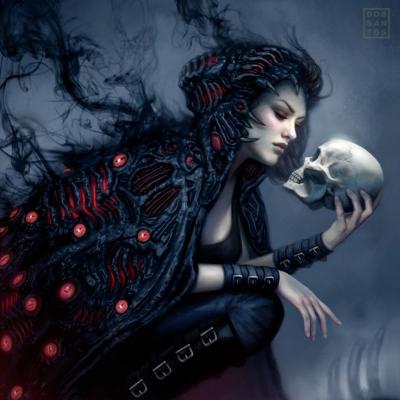Honor: 0 [ Give / Take ]
9 entries this month
The Arrow and the Song by Henry Wadsworth Longfellow 16:24 Jan 26 2014
Times Read: 462
The Arrow and the Song
by Henry Wadsworth Longfellow
I shot an arrow into the air,
It fell to earth, I knew not where;
For, so swiftly it flew, the sight
Could not follow it in its flight.
I breathed a song into the air,
It fell to earth, I knew not where;
For who has sight so keen and strong,
That it can follow the flight of song?
Long, long afterward, in an oak
I found the arrow, still unbroke;
And the song, from beginning to end,
I found again in the heart of a friend.

Henry Wadsworth Longfellow (1807-1882) was an influential American poet, translator and professor at Harvard University. Longfellow’s most significant work is, perhaps, Evangeline: A Tale of Acadie. During his life time, Longfellow was considered the best of all American poets, and his work was widely translated and published in other European languages: Italian, German and French to note a few. Some view Longfellow’s literary reputation as nearly sacrosanct, yet Edgar Allan Poe and Walt Whitman negatively critique his work. Walt Whitman would go so far as to accuse Longfellow as merely being an imitator of European forms. Whitman would praise Longfellow almost exclusively on his ability to keep his audience’s favor. He is the only American to be honored with a bust placed in the Poet’s Corner of Westminster Abbey.
Fire And Ice by Robert Frost
16:13 Jan 26 2014
Times Read: 464
Fire And Ice
by Robert Frost
Some say the world will end in fire,
Some say in ice.
From what I've tasted of desire
I hold with those who favor fire.
But if it had to perish twice,
I think I know enough of hate
To say that for destruction ice
Is also great
And would suffice.
William Shakespeare All The World's A Stage 16:09 Jan 26 2014
Times Read: 466
All The World's A Stage
by William Shakespeare
All the world's a stage,
And all the men and women merely players:
They have their exits and their entrances;
And one man in his time plays many parts,
His acts being seven ages. At first, the infant,
Mewling and puking in the nurse's arms.
And then the whining school-boy, with his satchel
And shining morning face, creeping like snail
Unwillingly to school. And then the lover,
Sighing like furnace, with a woeful ballad
Made to his mistress' eyebrow. Then a soldier,
Full of strange oaths and bearded like the pard,
Jealous in honour, sudden and quick in quarrel,
Seeking the bubble reputation
Even in the cannon's mouth. And then the justice,
In fair round belly with good capon lined,
With eyes severe and beard of formal cut,
Full of wise saws and modern instances;
And so he plays his part. The sixth age shifts
Into the lean and slipper'd pantaloon,
With spectacles on nose and pouch on side,
His youthful hose, well saved, a world too wide
For his shrunk shank; and his big manly voice,
Turning again toward childish treble, pipes
And whistles in his sound. Last scene of all,
That ends this strange eventful history,
Is second childishness and mere oblivion,
Sans teeth, sans eyes, sans taste, sans everything.

William Shakespeare (1564-1616) is regarded by many as one of the greatest poets/playwrights in history. This poem is an excerpt from his play "As you like it" The poem compares the world to a stage and life to a play, and catalogs seven stages in a man's life: infant, schoolboy, lover, soldier, justice, pantaloon, and old age, facing imminent death. The poem suggests that each stage in a man's life calls upon him to play another role.
Annabel Lee by Edgar Allan Poe16:04 Jan 26 2014
Times Read: 470
Annabel Lee
by Edgar Allan Poe
It was many and many a year ago,
In a kingdom by the sea,
That a maiden there lived whom you may know
By the name of ANNABEL LEE;
And this maiden she lived with no other thought
Than to love and be loved by me.
I was a child and she was a child,
In this kingdom by the sea;
But we loved with a love that was more than love-
I and my Annabel Lee;
With a love that the winged seraphs of heaven
Coveted her and me.
And this was the reason that, long ago,
In this kingdom by the sea,
A wind blew out of a cloud, chilling
My beautiful Annabel Lee;
So that her highborn kinsman came
And bore her away from me,
To shut her up in a sepulchre
In this kingdom by the sea.
The angels, not half so happy in heaven,
Went envying her and me-
Yes!- that was the reason (as all men know,
In this kingdom by the sea)
That the wind came out of the cloud by night,
Chilling and killing my Annabel Lee.
But our love it was stronger by far than the love
Of those who were older than we-
Of many far wiser than we-
And neither the angels in heaven above,
Nor the demons down under the sea,
Can ever dissever my soul from the soul
Of the beautiful Annabel Lee.
For the moon never beams without bringing me dreams
Of the beautiful Annabel Lee;
And the stars never rise but I feel the bright eyes
Of the beautiful Annabel Lee;
And so, all the night-tide, I lie down by the side
Of my darling- my darling- my life and my bride,
In the sepulchre there by the sea,
In her tomb by the sounding sea.

Annabel Lee was the last poem written by Poe. Like many of Poe's poems, this one is about lost love. It was published in 1849 shortly after his death. The subject mourns the death of his young love, Annabel Lee, and blames the angels for killing her out of jealousy for their love. He has since then slept by her grave, unable to accept her death. Edgar Allen Poe once said that the death of a beautiful woman is "the most poetical topic in the world". In this poem, the subject's lover, Annabel Lee was killed. The subject of the poem affirms that the love between him and Annabel Lee is so strong that even death can't separate them.
Edgar Allan Poe
16:01 Jan 26 2014
Times Read: 472
Edgar Allan Poe's short but mysterious and convoluted life is reflected in his darkly horrific literature, which has earned him an honored place in the history of American poets. Poe struggled with lifelong depression and alcoholism, most likely connected to the perpetually unstable condition of his family and residence. Poe's travelling stage actor parents, David and Elizabeth Poe, died in December 1811 in Richmond, Virginia, just less than three years after his birth in Boston, Massachusetts on January 19, 1809. Poe, his older brother Henry, and his younger sister Rosalie were left orphaned and ultimately separated when Edgar was taken in by Mr. John Allan and his wife Frances in Richmond, Virginia.
Under Allan's care, Poe was sent to boarding schools in England and America, and then to the University of Virginia for college. Despite his academic prestige at the institution, Poe was forced to leave before the conclusion of his first year as a result of his unpaid gambling debts. Poe left Richmond in 1827 and moved to Boston, where he enlisted in the United States Army and published his first collection of poems, entitled Tamerlane and Other Poems. Two years later, Poe was released from the army and published a second collection of poetry called Al Aaraaf, Tamerlane, and Minor Poems. Neither of his first two compilations garnered much public or critical acclaim, and shortly after the second publication, Poe entered the United States Military Academy at West Point, New York for six months until he was court-martialed and dismissed in March of 1831.
During the period of four years while Poe served in the United States Army, both his foster parents, John and Frances Allan, and his older brother Henry died, leaving Poe increasingly without relatives. However, he settled in Baltimore, Maryland in 1835 with his aunt Maria Clemm and her young daughter Virginia, only to move with the Clemms to Richmond, Virginia in 1836 where he took an editing position at the Southern Literary Messenger. That same year, a twenty-seven-year-old Poe married his thirteen-year-old cousin Virginia.
For the next decade, Poe relocated his new family to New York City, Philadelphia, and Baltimore in order to fill editorial positions at several magazines and newspapers. Until Virginia's death in 1847, Poe wrote and published many of his most famous works, including a collection of short stories titled Tales of the Grotesque and Arabesque, Murders in the Rue Morgue, The Tell-Tale Heart, and The Raven. These works, along with more of Poe's later writing, secured him as a pioneer in horror and detective literature.
After his beloved wife died from tuberculosis, Poe's depression swelled, as did his alcohol abuse. The disease hindered his engagement to widow Sarah Helen Whitman, who would not marry Poe unless he was completely sober. He could not clean up for Whitman but tried again for another fiancé, Elmira Royster Shelton, by entering the Sons of Temperance in 1849. Unfortunately, Poe was found less than six weeks later semi-unconscious in Baltimore and died in the Washington College Hospital on October 7, 1849. The author was buried next to his grandfather in the Westminster Burying Ground in Maryland.
J. R. R. Tolkien
15:51 Jan 26 2014
Times Read: 480
Song About Old Troll
by J. R. R. Tolkien
Troll sat alone on his seat of stone,
And munched and mumbled a bare old bone;
For many a year he had gnawed it near,
For meat was hard to come by.
Done by! Gum by!
In a cave in the hills he dwelt alone,
And meat was hard to come by.
Up came Tom with his big boots on.
Said he to Troll: "Pray, what is yon?
For it looks like the shin o' my nuncle Tim,
As should be a-lyin' in graveyard.
Caveyard! Paveyard!
This many a year has Tim been gone,
And I thought he were lyin' in graveyard."
"My lad," said Troll, "this bone I stole.
But what be bones that lie in a hole?
Thy nuncle was dead as a lump o' lead,
Afore I found his shinbone.
Tinbone! Thinbone!
He can spare a share for a poor old troll,
For he don't need his shinbone."
Said Tom: "I don't see why the likes o' thee
Without axin' leave should go makin' free
With the shank or the shin o' my father's kin;
So hand the old bone over!
Rover! Trover!
Though dead he be, it belongs to he;
So hand the old bone over!"
"For a couple o' pins," says Troll, and grins,
"I'll eat thee too, and gnaw thy shins.
A bit o' fresh meat will go down sweet!
I'll try my teeth on thee now.*
Hee now! See now!
I'm tired o' gnawing old bones and skins;
I've a mind to dine on thee now."
Thee'll be a nice change from thine nuncle.
Sunkle! Drunkle!
I'm tired of gnawing old bones and skins;
Thee'll be a nice change from thine nuncle."
But just as he thought his dinner was caught,
He found his hands had hold of naught.
Before he could mind, Tom slipped behind
And gave him the boot to larn him.
Warn him! Darn him!
A bump o' the boot on the seat, Tom thought,
Would be the way to larn him.
But harder than stone is the flesh and bone
Of a troll that sits in the hills alone.
As well set your boot to the mountain's root,
For the seat of a troll don't feel it.
Peel it! Heal it!
Old Troll laughed, when he heard Tom groan,
And he knew his toes could feel it.
Tom's leg is game, since home he came,
And his bootless foot is lasting lame;
But Troll don't care, and he's still there
With the bone he boned from it's owner.
Doner! Boner!
Troll's old seat is still the same,
And the bone he boned from it's owner!
Born in South Africa in January 1892, John Ronald Reuel Tolkien was orphaned in childhood and brought up in near-poverty. He served in the first World War, surviving the Battle of the Somme, where he lost many of the closest friends he'd ever had. After the war he returned to the academic life, achieving high repute as a scholar and university teacher, eventually becoming Merton Professor of English at Oxford where he was a close friend of C.S. Lewis and the other writers known as The Inklings.
Elizabeth Barrett Browning
15:48 Jan 26 2014
Times Read: 485
How Do I Love Thee?
by Elizabeth Barrett Browning
How do I love thee? Let me count the ways.
I love thee to the depth and breadth and height
My soul can reach, when feeling out of sight
For the ends of Being and ideal Grace.
I love thee to the level of every day's
Most quiet need, by sun and candlelight.
I love thee freely, as men strive for Right;
I love thee purely, as they turn from Praise.
I love with a passion put to use
In my old griefs, and with my childhood's faith.
I love thee with a love I seemed to lose
With my lost saints, I love thee with the breath,
Smiles, tears, of all my life! and, if God choose,
I shall but love thee better after death.
How Do I Love Thee? is one of the poems that make up the forty-four poems of "Sonnets from the Portuguese". They were written while she was still courting her future husband, Mr. Browning between 1845 and 1846.
19:34 Jan 25 2014
Times Read: 504
Still I Rise
by Maya Angelou
You may write me down in history
With your bitter, twisted lies,
You may tread me in the very dirt
But still, like dust, I'll rise.
Does my sassiness upset you?
Why are you beset with gloom?
'Cause I walk like I've got oil wells
Pumping in my living room.
Just like moons and like suns,
With the certainty of tides,
Just like hopes springing high,
Still I'll rise.
Did you want to see me broken?
Bowed head and lowered eyes?
Shoulders falling down like teardrops.
Weakened by my soulful cries.
Does my haughtiness offend you?
Don't you take it awful hard
'Cause I laugh like I've got gold mines
Diggin' in my own back yard.
You may shoot me with your words,
You may cut me with your eyes,
You may kill me with your hatefulness,
But still, like air, I'll rise.
Does my sexiness upset you?
Does it come as a surprise
That I dance like I've got diamonds
At the meeting of my thighs?
Out of the huts of history's shame
I rise
Up from a past that's rooted in pain
I rise
I'm a black ocean, leaping and wide,
Welling and swelling I bear in the tide.
Leaving behind nights of terror and fear
I rise
Into a daybreak that's wondrously clear
I rise
Bringing the gifts that my ancestors gave,
I am the dream and the hope of the slave.
I rise
I rise
I rise.
Maya Angelou is one of the most celebrated American Poets of our time. Born in 1928, her life has spanned much of the African American struggle for racial equality. She was a confidant of Malcolm X and Dr. Martin Luther King Jr. In this poem about courage, Angelou embodies the power, courage and tenacity of the African American experience.
19:05 Jan 25 2014
Times Read: 509
The Road Not Taken
by Robert Frost
Two roads diverged in a yellow wood,
And sorry I could not travel both
And be one traveler, long I stood
And looked down one as far as I could
To where it bent in the undergrowth;
Then took the other, as just as fair,
And having perhaps the better claim
Because it was grassy and wanted wear,
Though as for that the passing there
Had worn them really about the same,
And both that morning equally lay
In leaves no step had trodden black.
Oh, I kept the first for another day!
Yet knowing how way leads on to way
I doubted if I should ever come back.
I shall be telling this with a sigh
Somewhere ages and ages hence:
Two roads diverged in a wood, and I,
I took the one less traveled by,
And that has made all the difference
This poem by Robert Frost (1874-1963) is probably one of the most famous and celebrated American poems. The poem depicts the agony of a decision making and the rewards of forging your own path. The subject of the poem is faced with a decision of taking the "safe" route that others have taken before or breaking new ground. He says that he took the "road less traveled by, and that has made all the difference". He finds that making original and independent choices makes life rewarding.








COMMENTS
-